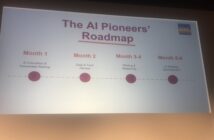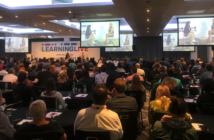On 12 February we will be running our Learning Technologies barcamp event. It takes place at the end of the first day of the Learning Technologies Conference and Exhibition – you can find out more and book tickets (which are free) here.
We decided on inclusion as the topic of conversation for the event after attending an excellent panel on the subject at last year’s Charity Learning Consortium conference. One idea from that conference that resonated for us was that you can have a diverse workforce but that doesn’t mean people will feel included. Diversity and inclusion are often lumped together but they are different things.
So what is inclusion, exactly? I found some useful pointers in a webinar I produced for a client last night. Drake Music has just published a paper on inclusion and inclusive practice in music making, entitled Making Music is the Key, and their webinar was on this very topic, exploring the what, why and how of inclusion.
John Kelly, a musician and Drake Music Associate Musician, shared four principles that support the idea of inclusion. I say the ‘idea’ of inclusion because the word itself can mean different things to different people.
Kelly suggested that it is useful to think of inclusion as a set of values and beliefs that are continually being tested and refined. His four principles for underpinning inclusion are:
1 Belonging
Kelly says this is a feeling of being comfortable and of others welcoming you. It feels right to be here, he says. You can be yourself when you feel you belong.
2 Understanding
Understanding comes from verbal and non-verbal dialogue, conversation and experiences. The needs and aspirations of individuals are taken seriously when they are understood.
You can say what you need to and you will be asked how you want things to be, rather than those things being assumed, he says. Our differences are an important part of how we belong and be ourselves. Kelly says that it is important to unpack what diversity and equality means in practice.
He says understanding is also about learning and practicing.
3 Contributing
There are many factors that impact on making a contribution, including:
- Being able to make and take active choices and control.
- Choosing how and what we want to do to be a part of music/making/decision making.
- Having the space to find our way to participate and contribute.
- Having control over pace so our needs are met and so we can contribute well, succeed and achieve things together as equals.
4 Being valued
At the heart of being valued is recognition for individuals of what they have achieved and the difference and change that has happened as a result. And from that comes personal acknowledgement, growth, confidence and esteem.
Recognising experience, contributions and learning are all a part of being valued. Reward happens on a personal level, by acknowledging how we feel and what that does to us, and also at a more formal level.
These are useful areas to consider when thinking about inclusion and what it might mean for employers. Hopefully Drake Music’s work will act as a good primer for our barcamp discussions.
Reserve your place at our barcamp here.
- Download Drake Music’s paper Making Music is the Key.




